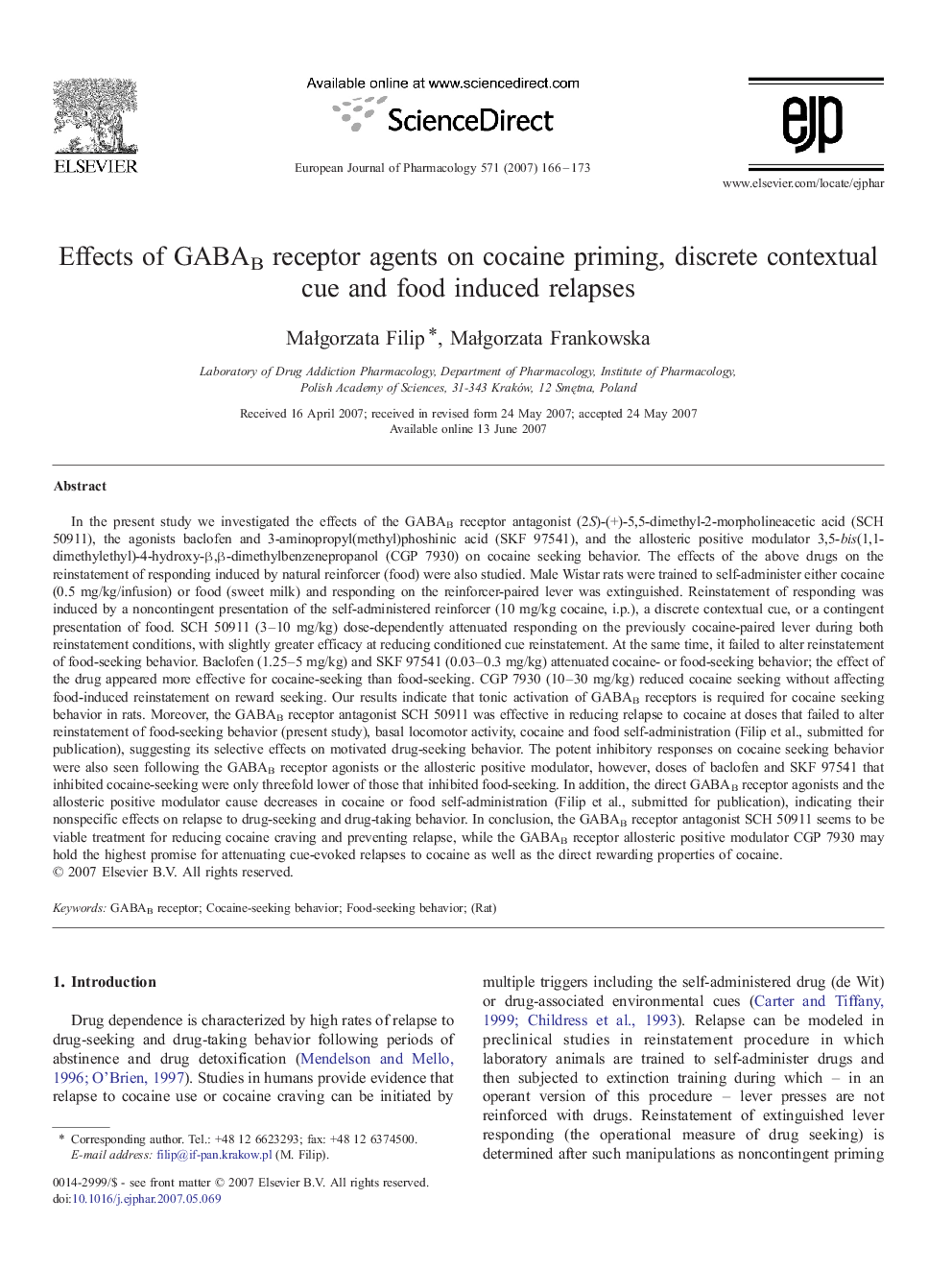| کد مقاله | کد نشریه | سال انتشار | مقاله انگلیسی | نسخه تمام متن |
|---|---|---|---|---|
| 2535842 | 1559134 | 2007 | 8 صفحه PDF | دانلود رایگان |

In the present study we investigated the effects of the GABAB receptor antagonist (2S)-(+)-5,5-dimethyl-2-morpholineacetic acid (SCH 50911), the agonists baclofen and 3-aminopropyl(methyl)phoshinic acid (SKF 97541), and the allosteric positive modulator 3,5-bis(1,1-dimethylethyl)-4-hydroxy-β,β-dimethylbenzenepropanol (CGP 7930) on cocaine seeking behavior. The effects of the above drugs on the reinstatement of responding induced by natural reinforcer (food) were also studied. Male Wistar rats were trained to self-administer either cocaine (0.5 mg/kg/infusion) or food (sweet milk) and responding on the reinforcer-paired lever was extinguished. Reinstatement of responding was induced by a noncontingent presentation of the self-administered reinforcer (10 mg/kg cocaine, i.p.), a discrete contextual cue, or a contingent presentation of food. SCH 50911 (3–10 mg/kg) dose-dependently attenuated responding on the previously cocaine-paired lever during both reinstatement conditions, with slightly greater efficacy at reducing conditioned cue reinstatement. At the same time, it failed to alter reinstatement of food-seeking behavior. Baclofen (1.25–5 mg/kg) and SKF 97541 (0.03–0.3 mg/kg) attenuated cocaine- or food-seeking behavior; the effect of the drug appeared more effective for cocaine-seeking than food-seeking. CGP 7930 (10–30 mg/kg) reduced cocaine seeking without affecting food-induced reinstatement on reward seeking. Our results indicate that tonic activation of GABAB receptors is required for cocaine seeking behavior in rats. Moreover, the GABAB receptor antagonist SCH 50911 was effective in reducing relapse to cocaine at doses that failed to alter reinstatement of food-seeking behavior (present study), basal locomotor activity, cocaine and food self-administration (Filip et al., submitted for publication), suggesting its selective effects on motivated drug-seeking behavior. The potent inhibitory responses on cocaine seeking behavior were also seen following the GABAB receptor agonists or the allosteric positive modulator, however, doses of baclofen and SKF 97541 that inhibited cocaine-seeking were only threefold lower of those that inhibited food-seeking. In addition, the direct GABAB receptor agonists and the allosteric positive modulator cause decreases in cocaine or food self-administration (Filip et al., submitted for publication), indicating their nonspecific effects on relapse to drug-seeking and drug-taking behavior. In conclusion, the GABAB receptor antagonist SCH 50911 seems to be viable treatment for reducing cocaine craving and preventing relapse, while the GABAB receptor allosteric positive modulator CGP 7930 may hold the highest promise for attenuating cue-evoked relapses to cocaine as well as the direct rewarding properties of cocaine.
Journal: European Journal of Pharmacology - Volume 571, Issues 2–3, 1 October 2007, Pages 166–173